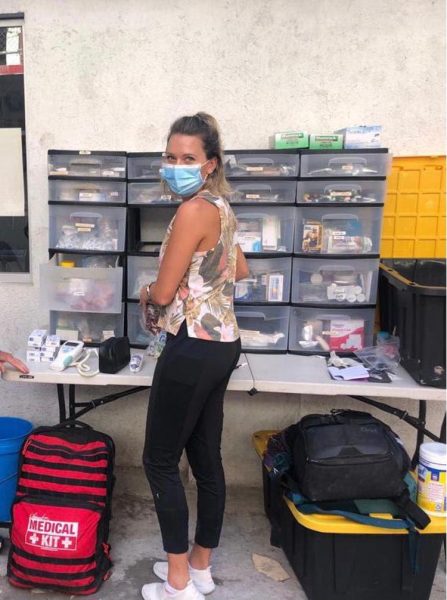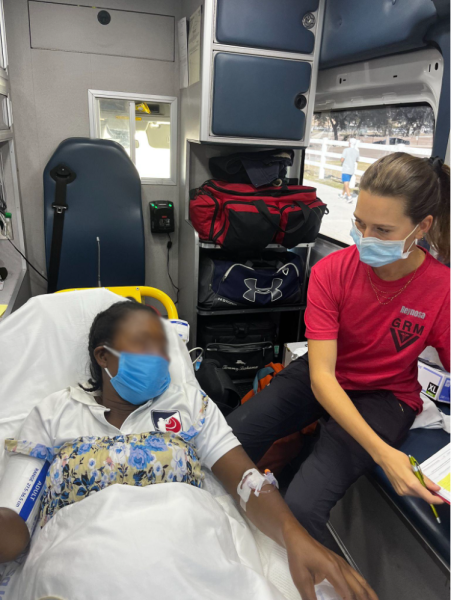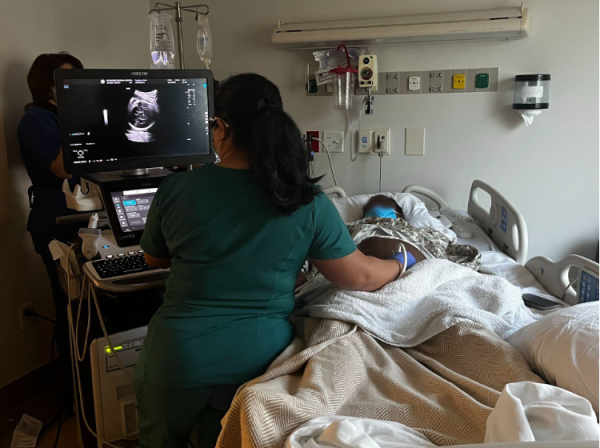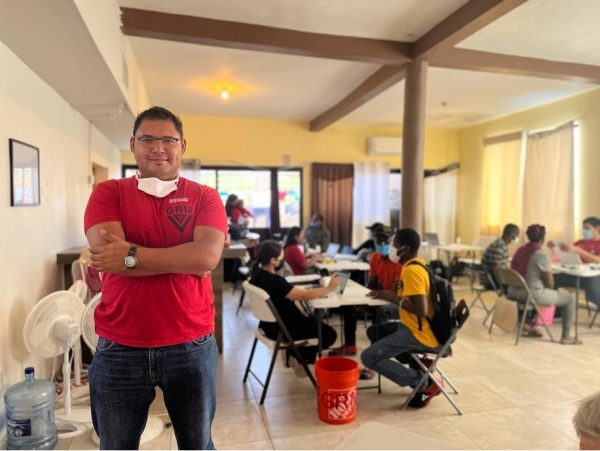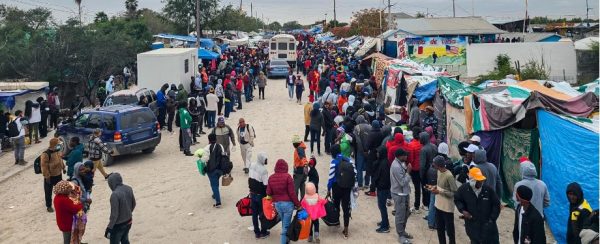
(17 November 2022, Reynosa, Tamaulipas in Mexico, several thousand people wait outside one of the main shelters, Senda de Vida. Photo credit: Brendon Tucker)
GRM REYNOSA (1 January 2022 to 31 October 2022):
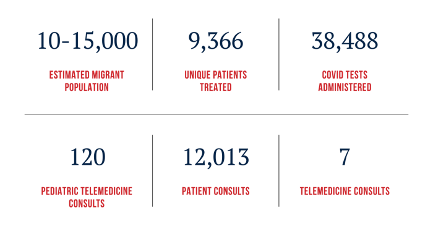
REYNOSA: The Mexican Town that Acts as a Barometer for World Politics
The number of people arriving in Reynosa continues to outstrip those being allowed into the United States, causing the migrant population to grow. As a result, our outreach team is working hard to publicize our clinics and emergency services among new arrivals.
There are currently around 10,000 people on the streets of Reynosa, Tamaulipas, in northern Mexico. Although, without an official population count, we estimate that there could be as many as 15,000. Global Response (GRM) provides medical care to the population living on the streets in Reynosa’s shelters including:
Campamento Rio (~500 people), Senda de Vida I (~1700),
Senda de Vida II (~1500),
Casa Migrante (~200), and Casa de Clinica (~50).
We have tested over 30,000 people this year for COVID-19. Positive COVID results are now extremely rare.
GRM medical providers have seen almost 10,000 unique patients in Reynosa this year (in over 12,000 consultations), 1,300 of whom were seen in October. Typically, complaints are a direct result of the inhumane living conditions: skin conditions, gastrointestinal disorders, and a significant percent of maternal health cases.
Telemedicine consults are available for specialty cases and insecure locations:
- Since the end of March 2022, we have provided over 120 pediatric telemedicine consults in conjunction with University of California San Francisco (UCSF) to residents of the Kaleo shelter in Reynosa, which our team does not physically visit as it is located to the west of the city in an area that we consider unsafe to travel.
- We have also provided telemedicine consults to Russian patients – where we were unable to find a local translator – through a partnership with Massachusetts General Hospital. Through these consults, our team has diagnosed conditions such as anxiety, depression, and PTSD.
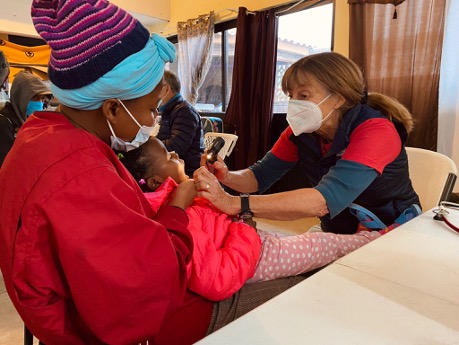
17 November 2022, Reynosa, Tamaulipas, GRM Volunteer, Jane Cross, pediatrician, treats a 2-year-old girl from Haiti, complaining of abdominal pain. Photo credit: Jade Bachtold
On average, we receive around one emergency call per day. The cases, varying in their urgency, have involved respiratory distress, trauma cases, maternal health complications, and emergent medical conditions such as heart attacks, strokes, and appendicitis.
Recent complicated cases have involved a young boy with Tuberculosis, a husband who was diagnosed with terminal cancer while his wife was in a maternal health consult with one of our physicians, and two patients with leprosy. When appropriate resources are not available in Mexico we attempt to place patients in hospitals in the US via humanitarian parole, although unfortunately not all patients survive the wait.
Changes in Citizenship as a Reflection of World Politics:
We have noticed that the town’s population reflects global events. On 21 September 2022, Russian President Putin introduced his conscription decree. A few weeks later, the migrant population in Reynosa saw Russians, Uzbecs,
and Chechens arriving in small groups with several stating ‘avoiding conscription’ as their reason for travel.
The following graph, based on Mexican Government statistics, shows the numbers of Russians entering Mexico in 2022. While the numbers are lower than the beginning of the year, they are trending slightly upwards, which tracks with what we are seeing in Reynosa. It is worth noting that Russian citizens do not currently need a visa to enter Mexico – they can apply online for an electronic travel authorization, making it relatively easy to enter the country.
Data from the Mexican Institute for Migration 2022:

[1]
The number of Russians encountered by Customs and Border Protection was also higher in September – the most recent data – than any month since May 2022. In October, there were fewer Venezuelans encountered at the southwest border but “encounters of Cuban and Nicaraguan asylum seekers fleeing their authoritarian regimes continue to be at an historic high. This reflects the challenge that is gripping the hemisphere, as displaced populations flee authoritarianism, corruption, violence, and poverty”, said CBP Acting Commissioner Troy Miller.[2]
Whatever happens in the world, it tends to follow that there are changes to the migrant population in Northern Mexico. With the disruption in Haiti, our clinic population saw a significant increase in Haitians in February and May of this year, following an increase in Haitians entering Mexico at the end of 2021. We saw a sharp increase in the number of Guatemalans after the twin hurricanes in 2020 and Afghan families after the 2021 pull out of US troops. At the start of the war in Ukraine in 2022, our Mexico clinics treated Ukrainian patients whilst GRM had another team in Ukraine doing the same.
That said, in spite of the increased number of Venezuelans entering Mexico, Venezuelans are underrepresented in the migrant population in Reynosa; we have seen fewer than 10 Venezuelan patients this year.
See here for a breakdown of our clinic’s population by month and by nationality.
Additional Background to Reynosa:
Reynosa accommodation is offered on a “conveyor belt system”. New arrivals have nothing as the shelters are full, eventually they may be given a tent by those moving into a shelter space and from the shelters they may be put on a list to assess whether or not they can cross to the United States.
By way of background, many people found themselves trapped on the border after the Trump administration implemented migration policies that aimed to prevent people entering the United States. The Biden Administration entered the White House vowing to end both of these policies although to date they
remain in place with a recent court decision requiring the US Government to terminate Title 42 within the next few weeks.[3]
Note that the US Government considers Tamaulipas to be so dangerous that it has issued a stage 4 – do not travel – advisory.
[1] http://portales.segob.gob.mx/work/models/PoliticaMigratoria/CEM/Estadisticas/Boletin es_Estadisticos/2022/Boletin_2022.pdf
[2] https://www.cbp.gov/newsroom/national-media-release/cbp-releases-october-2022- monthly-operational-update
[3] https://www.aclu.org/press-releases/federal-court-strikes-down-title-42-major-victory- asylum-seekers
Please get in touch if you would like to arrange a visit, schedule an interview with one of our staff or patients, visit the shelters in Reynosa, or procure images from the clinics.
For further information please contact:
[email protected]
Download PDF
